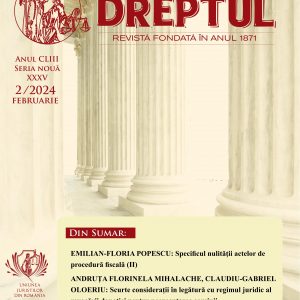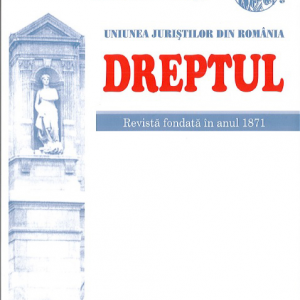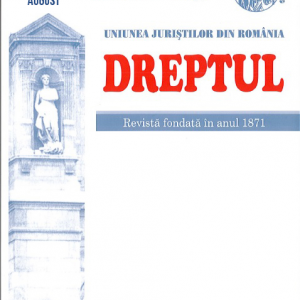-
 Declanșarea și judecarea unui proces atrag per se o serie de cheltuieli bănești care se materializează în taxele judiciare, onorariile avocaților, experților și ale altor specialiști, ori în sume de bani cuvenite martorilor chemați să răspundă în fața judecătorului, pe lângă multe alte inconveniente. Dacă sarcina înfăptuirii justiției aparține statului, principiu recunoscut în majoritatea sistemelor democratice, se pune problema sarcinii suportării cheltuielilor pe care le presupune judecarea unui litigiu. S-a ajuns astfel la „compromisul” prin care cheltuielile de judecată să fie împărțite, aproximativ proporțional, între stat și părțile litigante. Culpa procesuală este izvorul cheltuielilor de judecată, partea îndreptățită la acordarea acestora este partea litigantă, potrivnică celei care cade în pretenții și, pe cale de consecință, cea care a fost în culpă procesuală, prima fiind „victima” celei de-a doua. Ab initio trebuie precizat că stabilirea cheltuielilor de judecată va fi făcută de instanță numai în măsura în care acestea au fost solicitate în cursul procesului pendinte, faptul că instanța nu le-a acordat reprezentând o omisiune a acesteia, care poate fi îndreptată pe calea unei cereri de completare a hotărârii, dacă partea are deschisă această procedură. Probleme s-au ivit în legătură cu actualizarea cheltuielilor de judecată în faza de executare silită, când executorul judecătoresc proceda la punerea în executare a hotărârii judecătorești. Astfel, s-a născut întrebarea „Poate executorul judecătoresc să actualizeze sumele cuvenite creditorului cu titlu de cheltuieli judecătorești?” Înalta Curte de Casație și Justiție a limpezit problema de drept ridicată și a statuat că sumele acordate printr-o hotărâre judecătorească pot fi actualizate în funcție de rata inflației, de executorul judecătoresc în etapa executării silite (cu notă aprobativă).
Declanșarea și judecarea unui proces atrag per se o serie de cheltuieli bănești care se materializează în taxele judiciare, onorariile avocaților, experților și ale altor specialiști, ori în sume de bani cuvenite martorilor chemați să răspundă în fața judecătorului, pe lângă multe alte inconveniente. Dacă sarcina înfăptuirii justiției aparține statului, principiu recunoscut în majoritatea sistemelor democratice, se pune problema sarcinii suportării cheltuielilor pe care le presupune judecarea unui litigiu. S-a ajuns astfel la „compromisul” prin care cheltuielile de judecată să fie împărțite, aproximativ proporțional, între stat și părțile litigante. Culpa procesuală este izvorul cheltuielilor de judecată, partea îndreptățită la acordarea acestora este partea litigantă, potrivnică celei care cade în pretenții și, pe cale de consecință, cea care a fost în culpă procesuală, prima fiind „victima” celei de-a doua. Ab initio trebuie precizat că stabilirea cheltuielilor de judecată va fi făcută de instanță numai în măsura în care acestea au fost solicitate în cursul procesului pendinte, faptul că instanța nu le-a acordat reprezentând o omisiune a acesteia, care poate fi îndreptată pe calea unei cereri de completare a hotărârii, dacă partea are deschisă această procedură. Probleme s-au ivit în legătură cu actualizarea cheltuielilor de judecată în faza de executare silită, când executorul judecătoresc proceda la punerea în executare a hotărârii judecătorești. Astfel, s-a născut întrebarea „Poate executorul judecătoresc să actualizeze sumele cuvenite creditorului cu titlu de cheltuieli judecătorești?” Înalta Curte de Casație și Justiție a limpezit problema de drept ridicată și a statuat că sumele acordate printr-o hotărâre judecătorească pot fi actualizate în funcție de rata inflației, de executorul judecătoresc în etapa executării silite (cu notă aprobativă). -
 Proportionality of the enforcement measures constitutes, in essence, a fundamental principle of the civil enforcement procedure, which, although it does not have a regulation in terminis recognized in the Civil Procedure Code, already knows, at regulatory level, the valences of a principle, following only to be assimilated by the doctrine, by the practice and, consequently, by the legislator. Although it could be argued that proportionality is subsumed to the general principle of the right to a fair trial, we consider that it claims its own individuality at the level of the fundamental thesis leading the enforcement process, as compared to the specificity of the measures involved, the fairness of the procedure following to be appreciated by reference to the level at which all the other principles are observed, being a corollary thereof. The procedural guarantees which they enjoy, the remedies and the legally recognized consequences are elements that turn, therefore, the proportionality of the enforcement measures into a basic principle of the enforcement, on which a fair procedure is built, thus giving full expression to the valorisation of the rights and fundamental freedoms of the individual.
Proportionality of the enforcement measures constitutes, in essence, a fundamental principle of the civil enforcement procedure, which, although it does not have a regulation in terminis recognized in the Civil Procedure Code, already knows, at regulatory level, the valences of a principle, following only to be assimilated by the doctrine, by the practice and, consequently, by the legislator. Although it could be argued that proportionality is subsumed to the general principle of the right to a fair trial, we consider that it claims its own individuality at the level of the fundamental thesis leading the enforcement process, as compared to the specificity of the measures involved, the fairness of the procedure following to be appreciated by reference to the level at which all the other principles are observed, being a corollary thereof. The procedural guarantees which they enjoy, the remedies and the legally recognized consequences are elements that turn, therefore, the proportionality of the enforcement measures into a basic principle of the enforcement, on which a fair procedure is built, thus giving full expression to the valorisation of the rights and fundamental freedoms of the individual. -
 The author analyzes the condition of existence of common property for granting legal personality to an owners’ association in the light of the provisions included in the Law No 230/2007, starting from a solution of the judicial practice, reaching to the conclusion that the establishment of an association can not take place unless there is a common property of all members of the association.
The author analyzes the condition of existence of common property for granting legal personality to an owners’ association in the light of the provisions included in the Law No 230/2007, starting from a solution of the judicial practice, reaching to the conclusion that the establishment of an association can not take place unless there is a common property of all members of the association. -
 This article examines the fiduciary property through a historical and comparative analysis of the legislation and doctrine of Québec, France and Romania. The contemporary fiducia ought not to be confused for the Roman fiducia, whose name it borrowed. As a result of the reception of the Anglo-American trust in the mixed legal system of the Canadian province of Québec, the fiducia has been the subject of subsequent legal transplants into the continental tradition. The Romanian legislator, inspired by its French counterpart, took over the restrictions brought to the fiducia in said legal system. In the matter of real rights, this legislative option also meant the rejection of the doctrine of an ownerless patrimony, an innovation of the legal system of Québec, in search of a continental instrument to replace the division of title between the legal holder (trustee) and the equitable one (beneficiary), as enshrined in the Common Law tradition. Commenting on the solutions proposed within French legal literature (including the classification as a method of ownership or even as a result of dismemberment), the author argues that only a combination of them may fully explain the mechanism of the fiduciary ownership. In essence, the fiduciary owner acts like a true owner, but by virtue of a title held under a resolutive condition, while the beneficiary enjoys a virtuality of law in his capacity as an owner under a suspensive condition. However, the constraints to which the right of ownership transferred to the trustee is subject, in terms of its exclusivity and perpetuity, may be explained by the fiducia contract itself, the effects of which are assimilated to the conventional limitation operated, for example, through an inalienability clause. In other words, the fiduciary owner may be considered an owner under a resolutive condition, yet he remains subject to the conventional limitations brought upon by the very nature of the fiduciary operation.
This article examines the fiduciary property through a historical and comparative analysis of the legislation and doctrine of Québec, France and Romania. The contemporary fiducia ought not to be confused for the Roman fiducia, whose name it borrowed. As a result of the reception of the Anglo-American trust in the mixed legal system of the Canadian province of Québec, the fiducia has been the subject of subsequent legal transplants into the continental tradition. The Romanian legislator, inspired by its French counterpart, took over the restrictions brought to the fiducia in said legal system. In the matter of real rights, this legislative option also meant the rejection of the doctrine of an ownerless patrimony, an innovation of the legal system of Québec, in search of a continental instrument to replace the division of title between the legal holder (trustee) and the equitable one (beneficiary), as enshrined in the Common Law tradition. Commenting on the solutions proposed within French legal literature (including the classification as a method of ownership or even as a result of dismemberment), the author argues that only a combination of them may fully explain the mechanism of the fiduciary ownership. In essence, the fiduciary owner acts like a true owner, but by virtue of a title held under a resolutive condition, while the beneficiary enjoys a virtuality of law in his capacity as an owner under a suspensive condition. However, the constraints to which the right of ownership transferred to the trustee is subject, in terms of its exclusivity and perpetuity, may be explained by the fiducia contract itself, the effects of which are assimilated to the conventional limitation operated, for example, through an inalienability clause. In other words, the fiduciary owner may be considered an owner under a resolutive condition, yet he remains subject to the conventional limitations brought upon by the very nature of the fiduciary operation. -

-
 The regulation of the Civil Code on periodic ownership was preceded by the Law No 282/2002 and by the Government Emergency Ordinance No 14/2011, which have transposed the European Directives concerning consumer protection with regard to the utilisation or time-limited use of movable and immovable assets. As a legal modality of the ownership right, the characters of the periodic ownership, although qualified by Article 646 (1) of the Civil Code, which refers to Article 687 of the Civil Code, as a form of forced co-ownership, is delimited by it. The present study outlines these elements of difference, the specificity of periodic ownership as real right, the rights and obligations of the co-owners in the exercise of the prerogatives arising from this quality. Periodic ownership is a particular case of forced co-ownership, of a temporary nature, because several people successively and repetitively exercise the attribute of use, specific to the ownership right, over a movable or immovable asset, at fixed intervals of equal or unequal duration. This form of ownership implies an overlapping of the real right of each co-owner over the entire asset, but whose use is limited during one year to the duration indicated in the ownership title. The critical aspects concerning the relations between the co-owners are cantoned to the provisions of Article 691 (2) of the Civil Code on the sanction of excluding the co-owner who, through his conduct, causes to another co-owner a serious disturbance in the exercise of the prerogatives of the periodic ownership right.
The regulation of the Civil Code on periodic ownership was preceded by the Law No 282/2002 and by the Government Emergency Ordinance No 14/2011, which have transposed the European Directives concerning consumer protection with regard to the utilisation or time-limited use of movable and immovable assets. As a legal modality of the ownership right, the characters of the periodic ownership, although qualified by Article 646 (1) of the Civil Code, which refers to Article 687 of the Civil Code, as a form of forced co-ownership, is delimited by it. The present study outlines these elements of difference, the specificity of periodic ownership as real right, the rights and obligations of the co-owners in the exercise of the prerogatives arising from this quality. Periodic ownership is a particular case of forced co-ownership, of a temporary nature, because several people successively and repetitively exercise the attribute of use, specific to the ownership right, over a movable or immovable asset, at fixed intervals of equal or unequal duration. This form of ownership implies an overlapping of the real right of each co-owner over the entire asset, but whose use is limited during one year to the duration indicated in the ownership title. The critical aspects concerning the relations between the co-owners are cantoned to the provisions of Article 691 (2) of the Civil Code on the sanction of excluding the co-owner who, through his conduct, causes to another co-owner a serious disturbance in the exercise of the prerogatives of the periodic ownership right. -
 Unlike the previous Criminal Procedure Code (1968), which briefly provided that the prosecutor must prepare a reasoned proposal of taking the measure of preventive detention of the defendant, the new Criminal Procedure Code regulates in a more detailed manner the proposal for preventive detention of the defendant in the course of criminal prosecution, by introducing the obligation of the prosecutor to indicate the legal grounds. In exchange, the new criminal processual law does no longer provide the prosecutor’s obligation to hear the defendant in the presence of the lawyer of his choice or appointed ex officio, before drawing up the proposal for preventive detention, as provided in the previous Criminal Procedure Code. Under such circumstances, the authors analyze the institution of proposal of preventive detention, by presenting some critical aspects and by proposing some improvements to the new regulation. Key
Unlike the previous Criminal Procedure Code (1968), which briefly provided that the prosecutor must prepare a reasoned proposal of taking the measure of preventive detention of the defendant, the new Criminal Procedure Code regulates in a more detailed manner the proposal for preventive detention of the defendant in the course of criminal prosecution, by introducing the obligation of the prosecutor to indicate the legal grounds. In exchange, the new criminal processual law does no longer provide the prosecutor’s obligation to hear the defendant in the presence of the lawyer of his choice or appointed ex officio, before drawing up the proposal for preventive detention, as provided in the previous Criminal Procedure Code. Under such circumstances, the authors analyze the institution of proposal of preventive detention, by presenting some critical aspects and by proposing some improvements to the new regulation. Key -
 În legislaþia românã, oportunitatea manifestãrii procurorului în procedura insolvenþei aparþine în exclusivitate acestuia ºi se înscrie în liniile directoare oferite de art. 45 alin. (3) C.pr.civ. Legea nr. 85/2006 nu prevede obligativitatea comunicãrii Ministerului Public a hotãrârii de deschidere a procedurii, iar procurorul nu este titular al acþiunii în acoperirea pasivului. Autorul considerã cã instituirea obligaþiei procurorului de a participa ºi pune concluzii în procedurã ar asigura o apãrare eficientã a ordinii publice, oferind premisele înfãptuirii unei justiþii plenare, în care atât interesele de ordin privat, cât ºi cele generale ar fi ocrotite. „De lege ferenda”, se propune participarea obligatorie a procurorului la acþiunea în acoperirea pasivului.
În legislaþia românã, oportunitatea manifestãrii procurorului în procedura insolvenþei aparþine în exclusivitate acestuia ºi se înscrie în liniile directoare oferite de art. 45 alin. (3) C.pr.civ. Legea nr. 85/2006 nu prevede obligativitatea comunicãrii Ministerului Public a hotãrârii de deschidere a procedurii, iar procurorul nu este titular al acþiunii în acoperirea pasivului. Autorul considerã cã instituirea obligaþiei procurorului de a participa ºi pune concluzii în procedurã ar asigura o apãrare eficientã a ordinii publice, oferind premisele înfãptuirii unei justiþii plenare, în care atât interesele de ordin privat, cât ºi cele generale ar fi ocrotite. „De lege ferenda”, se propune participarea obligatorie a procurorului la acþiunea în acoperirea pasivului. -
 ANDREESCU, MARIUS - Principiul proporționalitãții, criteriu de admisibilitate a cererilor de înlocuire a mãsurii arestãrii preventive. În: Dreptul, nr. 4/2010, p. 169-174. „De lege ferenda”, autorul propune ca în noul Cod penal, la capitolul care reglementeazã individualizarea judiciarã a pedepsei, sã se prevadã în mod expres cã sancțiunea penalã trebuie sã fie proporționalã cu situația de fapt, gradul de pericol social al faptei și scopul legii penale. În acest fel, s-ar garanta nu numai legalitatea sancțiunilor penale aplicate, dar și legitimitatea, justețea acestora în raport cu criteriile prevãzute de lege. Subiect: arestare preventivã; principiul proporționalitãții; noul Cod penal.
ANDREESCU, MARIUS - Principiul proporționalitãții, criteriu de admisibilitate a cererilor de înlocuire a mãsurii arestãrii preventive. În: Dreptul, nr. 4/2010, p. 169-174. „De lege ferenda”, autorul propune ca în noul Cod penal, la capitolul care reglementeazã individualizarea judiciarã a pedepsei, sã se prevadã în mod expres cã sancțiunea penalã trebuie sã fie proporționalã cu situația de fapt, gradul de pericol social al faptei și scopul legii penale. În acest fel, s-ar garanta nu numai legalitatea sancțiunilor penale aplicate, dar și legitimitatea, justețea acestora în raport cu criteriile prevãzute de lege. Subiect: arestare preventivã; principiul proporționalitãții; noul Cod penal. -
 1. ANDREESCU, MARIUS – Constituționalitatea recursului în interesul legii și a deciziilor pronunțate. În: „Curierul judiciar” – nr. 1/2011, p. 35-38. Autorul susține propunerea de lege ferenda ca, în perspectiva unei revizuiri a Constituției, sã se prevadã competența Curții Constituționale de a exercita control de constituționalitate asupra deciziilor pronunțate de Înalta Curte de Casație și Justiție în procedura recursului în interesul legii și asupra actelor juridice exceptate de la controlul judecãtoresc.
1. ANDREESCU, MARIUS – Constituționalitatea recursului în interesul legii și a deciziilor pronunțate. În: „Curierul judiciar” – nr. 1/2011, p. 35-38. Autorul susține propunerea de lege ferenda ca, în perspectiva unei revizuiri a Constituției, sã se prevadã competența Curții Constituționale de a exercita control de constituționalitate asupra deciziilor pronunțate de Înalta Curte de Casație și Justiție în procedura recursului în interesul legii și asupra actelor juridice exceptate de la controlul judecãtoresc. -
 1. ALEXE, IRINA – Aspecte privind mobilitatea înalților funcționari publici reflectate de jurisprudenþa instanțelor din România, în „Revista de drept public” nr. 1-2/2012, p. 90-102. Autoarea, în urma analizei reglementãrilor în vigoare și a jurisprudenței în domeniu, face urmãtoarea propunere de lege ferenda: se apreciazã ca fiind judicioasã introducerea formulãrii “principiul mobilitãții”, cu consecințele de rigoare, în primul rând aceea de a stabili un cadru programat întemeiat pe criterii clare și coerente în aplicarea principiului mobilitãții.
1. ALEXE, IRINA – Aspecte privind mobilitatea înalților funcționari publici reflectate de jurisprudenþa instanțelor din România, în „Revista de drept public” nr. 1-2/2012, p. 90-102. Autoarea, în urma analizei reglementãrilor în vigoare și a jurisprudenței în domeniu, face urmãtoarea propunere de lege ferenda: se apreciazã ca fiind judicioasã introducerea formulãrii “principiul mobilitãții”, cu consecințele de rigoare, în primul rând aceea de a stabili un cadru programat întemeiat pe criterii clare și coerente în aplicarea principiului mobilitãții. -
 Currently, under the increasingly intense and diverse interactions between countries, due to the unprecedented mobility of individuals, in space, or to the dynamics of public international law, as such, (for example, in international human rights or international criminal law) the theoretical model that governs the relationship between international law and domestic law has become a topical one. In addition, the existence of several supra-state forms of cooperation, such as the European Union, bring into question the relationship that is being established, on the one hand, between the law of those forms of cooperation and the Member States' national law and, on the other hand, between the former and general international law. In this paper I will discuss the relationship between international law and Romanian domestic law, as regulated by Romania’s organic and constitutional provisions and taking due account of Romania’s EU membership. The paper is structured in three sections corresponding to the general theoretical approaches to the matter (Section II), the legal, institutional and scholars’ approaches (Section III) and conclusions and de lege ferenda proposals; the latter will address both the content of the regulations, as well as some aspects of legislative technique (Section IV).
Currently, under the increasingly intense and diverse interactions between countries, due to the unprecedented mobility of individuals, in space, or to the dynamics of public international law, as such, (for example, in international human rights or international criminal law) the theoretical model that governs the relationship between international law and domestic law has become a topical one. In addition, the existence of several supra-state forms of cooperation, such as the European Union, bring into question the relationship that is being established, on the one hand, between the law of those forms of cooperation and the Member States' national law and, on the other hand, between the former and general international law. In this paper I will discuss the relationship between international law and Romanian domestic law, as regulated by Romania’s organic and constitutional provisions and taking due account of Romania’s EU membership. The paper is structured in three sections corresponding to the general theoretical approaches to the matter (Section II), the legal, institutional and scholars’ approaches (Section III) and conclusions and de lege ferenda proposals; the latter will address both the content of the regulations, as well as some aspects of legislative technique (Section IV).
